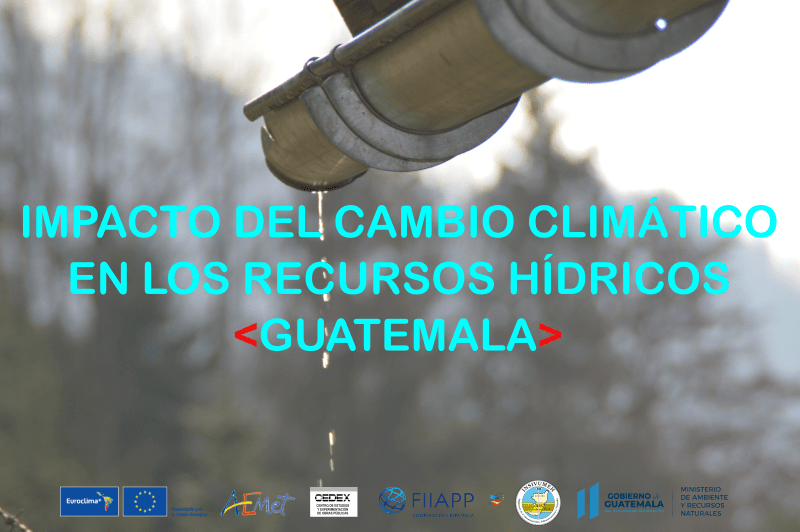The online training course demonstrated the process of assessing the impact of climate change on water resources, using a simple modelling tool.
Guatemala City, 26 November - The five sessions of the virtual course Impact of Climate Change on the Water Resources of Guatemala were held during the months of October and November. The training has been developed within the framework of the action Generation of regionalised climate change scenarios for Central America, with the participation of Guatemala, El Salvador, Honduras, Nicaragua, Costa Rica and Panama, implemented by the International and Ibero-America Foundation for Administration and Public Policy (FIIAPP), with the collaboration of the Centre for Studies and Experimentation of Public Works of Spain (CEDEX) and the State Meteorology Agency of Spain (AEMET).
The training was based on the experience developed by Spain in the heart of the CEH-CEDEX, with the idea of transferring the methodology carried out and the procedure for analysing the results to the Guatemalan context. The exchange of experiences through the mobilisation of public experts and knowledge between the different partner countries in both regions is one of the keys to the cooperation model promoted by the programme. The course lecturers on this occasion were Luis Barranco, technical advisor of the Hydrological Planning Area of the Hydrographic Studies Centre of CEDEX (Spain), José Moyano Capilla, of the Hydrology Area of the Hydrographic Studies Centre of CEDEX (Spain) and Alfonso Hernanz Lázaro, Head of the Variability and Regionalisation Techniques Service of the AEMET.
As a result of the first phase of this action, participating countries have strengthened their capacities and have the tools for generating regionalised climate change scenarios. In addition, they have a scenario viewer that facilitates access to local-scale climate projections, as well as free downloading of the data collections from which the scenarios are developed. During the last few years, the EUROCLIMA+ programme, FIIAPP, AEMET and CEDEX have been providing different training courses to the staff of the National Meteorological and Hydrological Services (NMHS) of the 6 countries participating in the action, as well as to the staff of the Ministries of Environment, and workshops were held with the national users of each country.
In a second phase of the action (2021-2022), the aim is to consolidate the scenario viewer as a living tool, easy to use and in continuous contact with potential users, to promote the use of the scenarios already generated and to facilitate the updating of the scenarios based on the results of the CMIP6.
The EUROCLIMA+ programme works with a demand-driven cooperation approach from the countries. It is with this approach that the need has been identified to strengthen the response to Climate Change in the country's water resources, a sector prioritised by the country itself, improving adaptation based on quality information and reinforcing the training of public personnel.
About EUROCLIMA+
EUROCLIMA+ is a programme funded by the European Union to promote environmentally sustainable and climate-resilient development in 18 Latin American countries, particularly for the benefit of the most vulnerable populations. The Programme is implemented under the synergistic work of seven agencies: the Spanish Agency for International Development Cooperation (AECID), the French Development Agency (AFD), the Economic Commission for Latin America and the Caribbean (ECLAC), the German Society for International Cooperation (GIZ) GmbH, Expertise France (EF), the International and Ibero-America Foundation for Administration and Public Policy (FIIAPP), and UN Environment.
Contact:
Daniel Fernández This email address is being protected from spambots. You need JavaScript enabled to view it.
